The Impact of Information Systems and ERP on Business Management
VerifiedAdded on 2023/01/12
|11
|2704
|41
Essay
AI Summary
This essay provides a comprehensive overview of information systems and their significance in business management, with a specific focus on Enterprise Resource Planning (ERP) systems. It begins by defining information systems and outlining their various types, highlighting their role in organizing and analyzing data. The essay then delves into the benefits of ERP systems, such as improved process efficiency, accurate forecasting, and scalability, using Tesco as a case study to illustrate these advantages. Furthermore, it examines how ERP systems enhance data collection, organization, and discrimination capabilities within a business, emphasizing the importance of paperless automation, increased productivity, and real-time access to information. The conclusion reiterates the critical role of information technology in managing and securing business information, making it an invaluable tool for converting raw data into actionable insights and fostering a more efficient and equitable workplace. The essay recommends the use of IT tools to help Tesco manage and secure its business information.

Essay
Paraphrase This Document
Need a fresh take? Get an instant paraphrase of this document with our AI Paraphraser
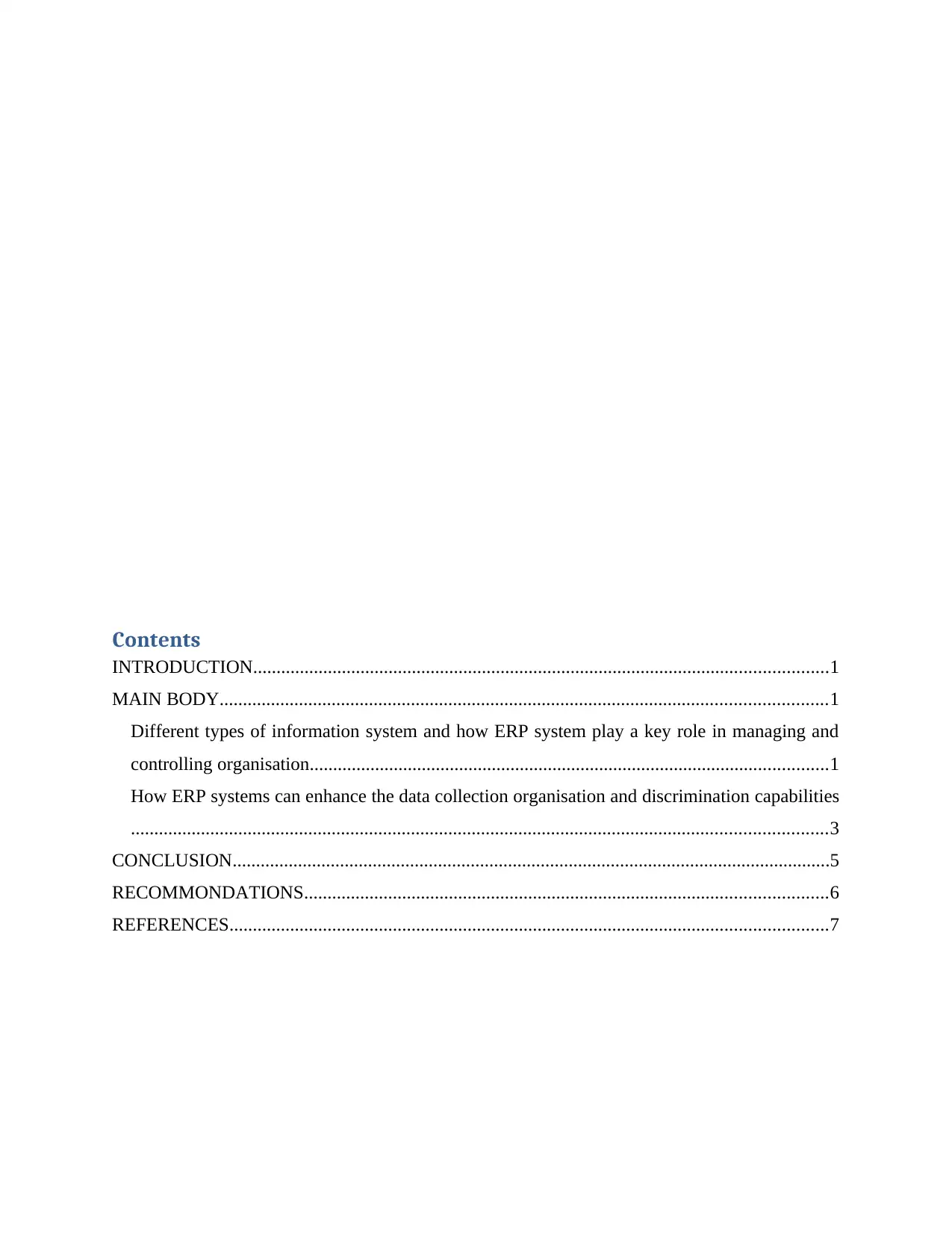
Contents
INTRODUCTION...........................................................................................................................1
MAIN BODY..................................................................................................................................1
Different types of information system and how ERP system play a key role in managing and
controlling organisation...............................................................................................................1
How ERP systems can enhance the data collection organisation and discrimination capabilities
.....................................................................................................................................................3
CONCLUSION................................................................................................................................5
RECOMMONDATIONS................................................................................................................6
REFERENCES................................................................................................................................7
INTRODUCTION...........................................................................................................................1
MAIN BODY..................................................................................................................................1
Different types of information system and how ERP system play a key role in managing and
controlling organisation...............................................................................................................1
How ERP systems can enhance the data collection organisation and discrimination capabilities
.....................................................................................................................................................3
CONCLUSION................................................................................................................................5
RECOMMONDATIONS................................................................................................................6
REFERENCES................................................................................................................................7

⊘ This is a preview!⊘
Do you want full access?
Subscribe today to unlock all pages.

Trusted by 1+ million students worldwide
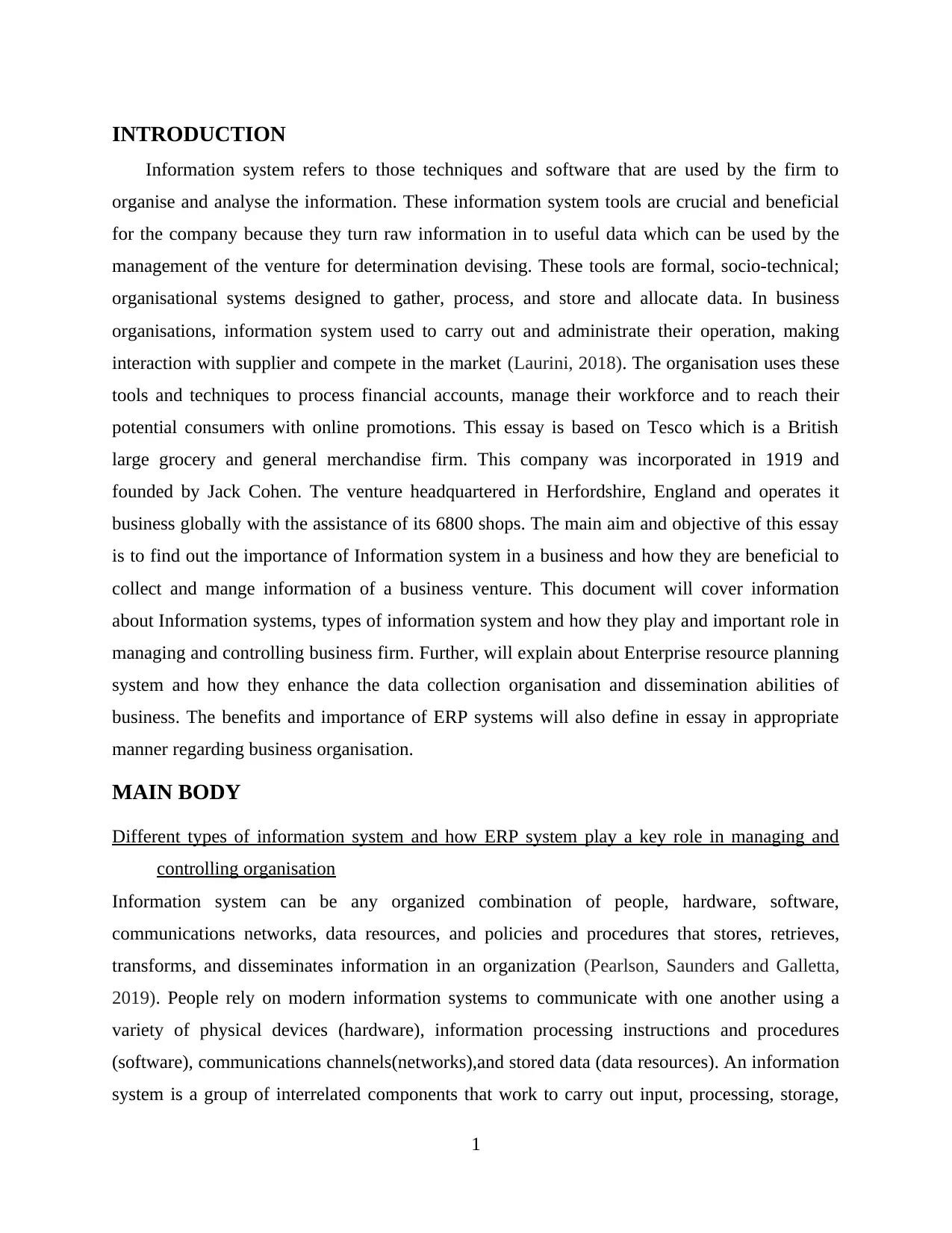
INTRODUCTION
Information system refers to those techniques and software that are used by the firm to
organise and analyse the information. These information system tools are crucial and beneficial
for the company because they turn raw information in to useful data which can be used by the
management of the venture for determination devising. These tools are formal, socio-technical;
organisational systems designed to gather, process, and store and allocate data. In business
organisations, information system used to carry out and administrate their operation, making
interaction with supplier and compete in the market (Laurini, 2018). The organisation uses these
tools and techniques to process financial accounts, manage their workforce and to reach their
potential consumers with online promotions. This essay is based on Tesco which is a British
large grocery and general merchandise firm. This company was incorporated in 1919 and
founded by Jack Cohen. The venture headquartered in Herfordshire, England and operates it
business globally with the assistance of its 6800 shops. The main aim and objective of this essay
is to find out the importance of Information system in a business and how they are beneficial to
collect and mange information of a business venture. This document will cover information
about Information systems, types of information system and how they play and important role in
managing and controlling business firm. Further, will explain about Enterprise resource planning
system and how they enhance the data collection organisation and dissemination abilities of
business. The benefits and importance of ERP systems will also define in essay in appropriate
manner regarding business organisation.
MAIN BODY
Different types of information system and how ERP system play a key role in managing and
controlling organisation
Information system can be any organized combination of people, hardware, software,
communications networks, data resources, and policies and procedures that stores, retrieves,
transforms, and disseminates information in an organization (Pearlson, Saunders and Galletta,
2019). People rely on modern information systems to communicate with one another using a
variety of physical devices (hardware), information processing instructions and procedures
(software), communications channels(networks),and stored data (data resources). An information
system is a group of interrelated components that work to carry out input, processing, storage,
1
Information system refers to those techniques and software that are used by the firm to
organise and analyse the information. These information system tools are crucial and beneficial
for the company because they turn raw information in to useful data which can be used by the
management of the venture for determination devising. These tools are formal, socio-technical;
organisational systems designed to gather, process, and store and allocate data. In business
organisations, information system used to carry out and administrate their operation, making
interaction with supplier and compete in the market (Laurini, 2018). The organisation uses these
tools and techniques to process financial accounts, manage their workforce and to reach their
potential consumers with online promotions. This essay is based on Tesco which is a British
large grocery and general merchandise firm. This company was incorporated in 1919 and
founded by Jack Cohen. The venture headquartered in Herfordshire, England and operates it
business globally with the assistance of its 6800 shops. The main aim and objective of this essay
is to find out the importance of Information system in a business and how they are beneficial to
collect and mange information of a business venture. This document will cover information
about Information systems, types of information system and how they play and important role in
managing and controlling business firm. Further, will explain about Enterprise resource planning
system and how they enhance the data collection organisation and dissemination abilities of
business. The benefits and importance of ERP systems will also define in essay in appropriate
manner regarding business organisation.
MAIN BODY
Different types of information system and how ERP system play a key role in managing and
controlling organisation
Information system can be any organized combination of people, hardware, software,
communications networks, data resources, and policies and procedures that stores, retrieves,
transforms, and disseminates information in an organization (Pearlson, Saunders and Galletta,
2019). People rely on modern information systems to communicate with one another using a
variety of physical devices (hardware), information processing instructions and procedures
(software), communications channels(networks),and stored data (data resources). An information
system is a group of interrelated components that work to carry out input, processing, storage,
1
Paraphrase This Document
Need a fresh take? Get an instant paraphrase of this document with our AI Paraphraser
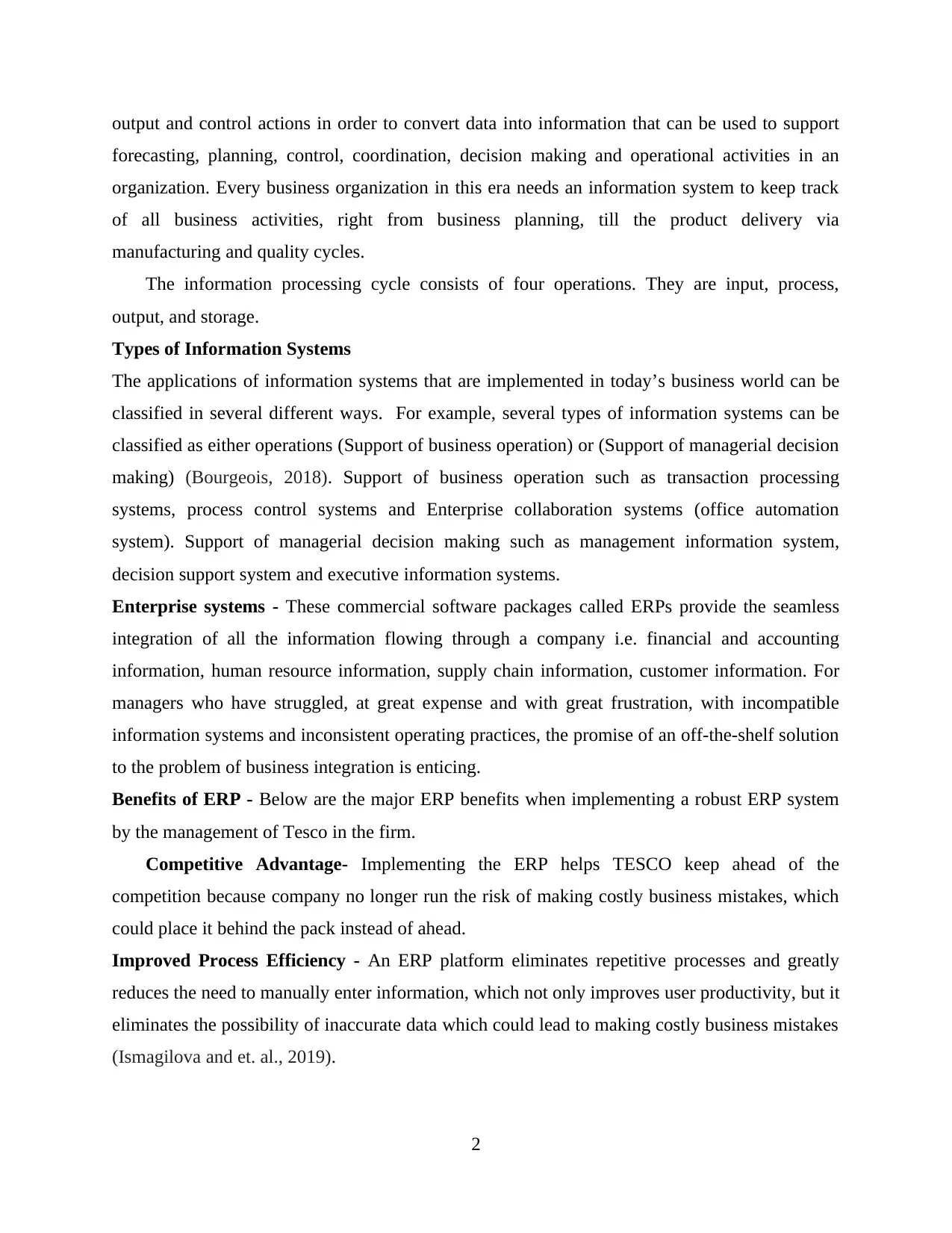
output and control actions in order to convert data into information that can be used to support
forecasting, planning, control, coordination, decision making and operational activities in an
organization. Every business organization in this era needs an information system to keep track
of all business activities, right from business planning, till the product delivery via
manufacturing and quality cycles.
The information processing cycle consists of four operations. They are input, process,
output, and storage.
Types of Information Systems
The applications of information systems that are implemented in today’s business world can be
classified in several different ways. For example, several types of information systems can be
classified as either operations (Support of business operation) or (Support of managerial decision
making) (Bourgeois, 2018). Support of business operation such as transaction processing
systems, process control systems and Enterprise collaboration systems (office automation
system). Support of managerial decision making such as management information system,
decision support system and executive information systems.
Enterprise systems - These commercial software packages called ERPs provide the seamless
integration of all the information flowing through a company i.e. financial and accounting
information, human resource information, supply chain information, customer information. For
managers who have struggled, at great expense and with great frustration, with incompatible
information systems and inconsistent operating practices, the promise of an off-the-shelf solution
to the problem of business integration is enticing.
Benefits of ERP - Below are the major ERP benefits when implementing a robust ERP system
by the management of Tesco in the firm.
Competitive Advantage- Implementing the ERP helps TESCO keep ahead of the
competition because company no longer run the risk of making costly business mistakes, which
could place it behind the pack instead of ahead.
Improved Process Efficiency - An ERP platform eliminates repetitive processes and greatly
reduces the need to manually enter information, which not only improves user productivity, but it
eliminates the possibility of inaccurate data which could lead to making costly business mistakes
(Ismagilova and et. al., 2019).
2
forecasting, planning, control, coordination, decision making and operational activities in an
organization. Every business organization in this era needs an information system to keep track
of all business activities, right from business planning, till the product delivery via
manufacturing and quality cycles.
The information processing cycle consists of four operations. They are input, process,
output, and storage.
Types of Information Systems
The applications of information systems that are implemented in today’s business world can be
classified in several different ways. For example, several types of information systems can be
classified as either operations (Support of business operation) or (Support of managerial decision
making) (Bourgeois, 2018). Support of business operation such as transaction processing
systems, process control systems and Enterprise collaboration systems (office automation
system). Support of managerial decision making such as management information system,
decision support system and executive information systems.
Enterprise systems - These commercial software packages called ERPs provide the seamless
integration of all the information flowing through a company i.e. financial and accounting
information, human resource information, supply chain information, customer information. For
managers who have struggled, at great expense and with great frustration, with incompatible
information systems and inconsistent operating practices, the promise of an off-the-shelf solution
to the problem of business integration is enticing.
Benefits of ERP - Below are the major ERP benefits when implementing a robust ERP system
by the management of Tesco in the firm.
Competitive Advantage- Implementing the ERP helps TESCO keep ahead of the
competition because company no longer run the risk of making costly business mistakes, which
could place it behind the pack instead of ahead.
Improved Process Efficiency - An ERP platform eliminates repetitive processes and greatly
reduces the need to manually enter information, which not only improves user productivity, but it
eliminates the possibility of inaccurate data which could lead to making costly business mistakes
(Ismagilova and et. al., 2019).
2
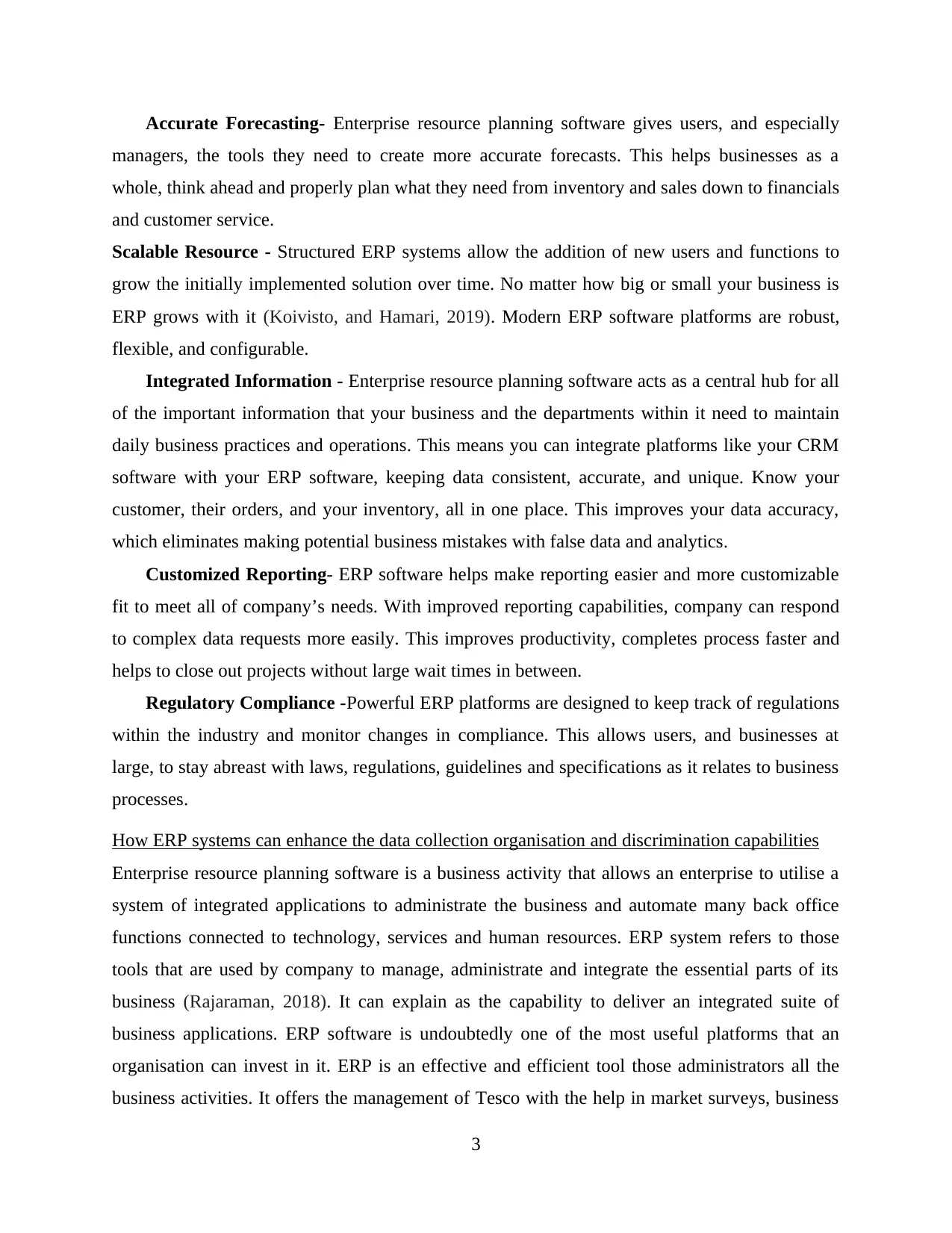
Accurate Forecasting- Enterprise resource planning software gives users, and especially
managers, the tools they need to create more accurate forecasts. This helps businesses as a
whole, think ahead and properly plan what they need from inventory and sales down to financials
and customer service.
Scalable Resource - Structured ERP systems allow the addition of new users and functions to
grow the initially implemented solution over time. No matter how big or small your business is
ERP grows with it (Koivisto, and Hamari, 2019). Modern ERP software platforms are robust,
flexible, and configurable.
Integrated Information - Enterprise resource planning software acts as a central hub for all
of the important information that your business and the departments within it need to maintain
daily business practices and operations. This means you can integrate platforms like your CRM
software with your ERP software, keeping data consistent, accurate, and unique. Know your
customer, their orders, and your inventory, all in one place. This improves your data accuracy,
which eliminates making potential business mistakes with false data and analytics.
Customized Reporting- ERP software helps make reporting easier and more customizable
fit to meet all of company’s needs. With improved reporting capabilities, company can respond
to complex data requests more easily. This improves productivity, completes process faster and
helps to close out projects without large wait times in between.
Regulatory Compliance -Powerful ERP platforms are designed to keep track of regulations
within the industry and monitor changes in compliance. This allows users, and businesses at
large, to stay abreast with laws, regulations, guidelines and specifications as it relates to business
processes.
How ERP systems can enhance the data collection organisation and discrimination capabilities
Enterprise resource planning software is a business activity that allows an enterprise to utilise a
system of integrated applications to administrate the business and automate many back office
functions connected to technology, services and human resources. ERP system refers to those
tools that are used by company to manage, administrate and integrate the essential parts of its
business (Rajaraman, 2018). It can explain as the capability to deliver an integrated suite of
business applications. ERP software is undoubtedly one of the most useful platforms that an
organisation can invest in it. ERP is an effective and efficient tool those administrators all the
business activities. It offers the management of Tesco with the help in market surveys, business
3
managers, the tools they need to create more accurate forecasts. This helps businesses as a
whole, think ahead and properly plan what they need from inventory and sales down to financials
and customer service.
Scalable Resource - Structured ERP systems allow the addition of new users and functions to
grow the initially implemented solution over time. No matter how big or small your business is
ERP grows with it (Koivisto, and Hamari, 2019). Modern ERP software platforms are robust,
flexible, and configurable.
Integrated Information - Enterprise resource planning software acts as a central hub for all
of the important information that your business and the departments within it need to maintain
daily business practices and operations. This means you can integrate platforms like your CRM
software with your ERP software, keeping data consistent, accurate, and unique. Know your
customer, their orders, and your inventory, all in one place. This improves your data accuracy,
which eliminates making potential business mistakes with false data and analytics.
Customized Reporting- ERP software helps make reporting easier and more customizable
fit to meet all of company’s needs. With improved reporting capabilities, company can respond
to complex data requests more easily. This improves productivity, completes process faster and
helps to close out projects without large wait times in between.
Regulatory Compliance -Powerful ERP platforms are designed to keep track of regulations
within the industry and monitor changes in compliance. This allows users, and businesses at
large, to stay abreast with laws, regulations, guidelines and specifications as it relates to business
processes.
How ERP systems can enhance the data collection organisation and discrimination capabilities
Enterprise resource planning software is a business activity that allows an enterprise to utilise a
system of integrated applications to administrate the business and automate many back office
functions connected to technology, services and human resources. ERP system refers to those
tools that are used by company to manage, administrate and integrate the essential parts of its
business (Rajaraman, 2018). It can explain as the capability to deliver an integrated suite of
business applications. ERP software is undoubtedly one of the most useful platforms that an
organisation can invest in it. ERP is an effective and efficient tool those administrators all the
business activities. It offers the management of Tesco with the help in market surveys, business
3
⊘ This is a preview!⊘
Do you want full access?
Subscribe today to unlock all pages.

Trusted by 1+ million students worldwide
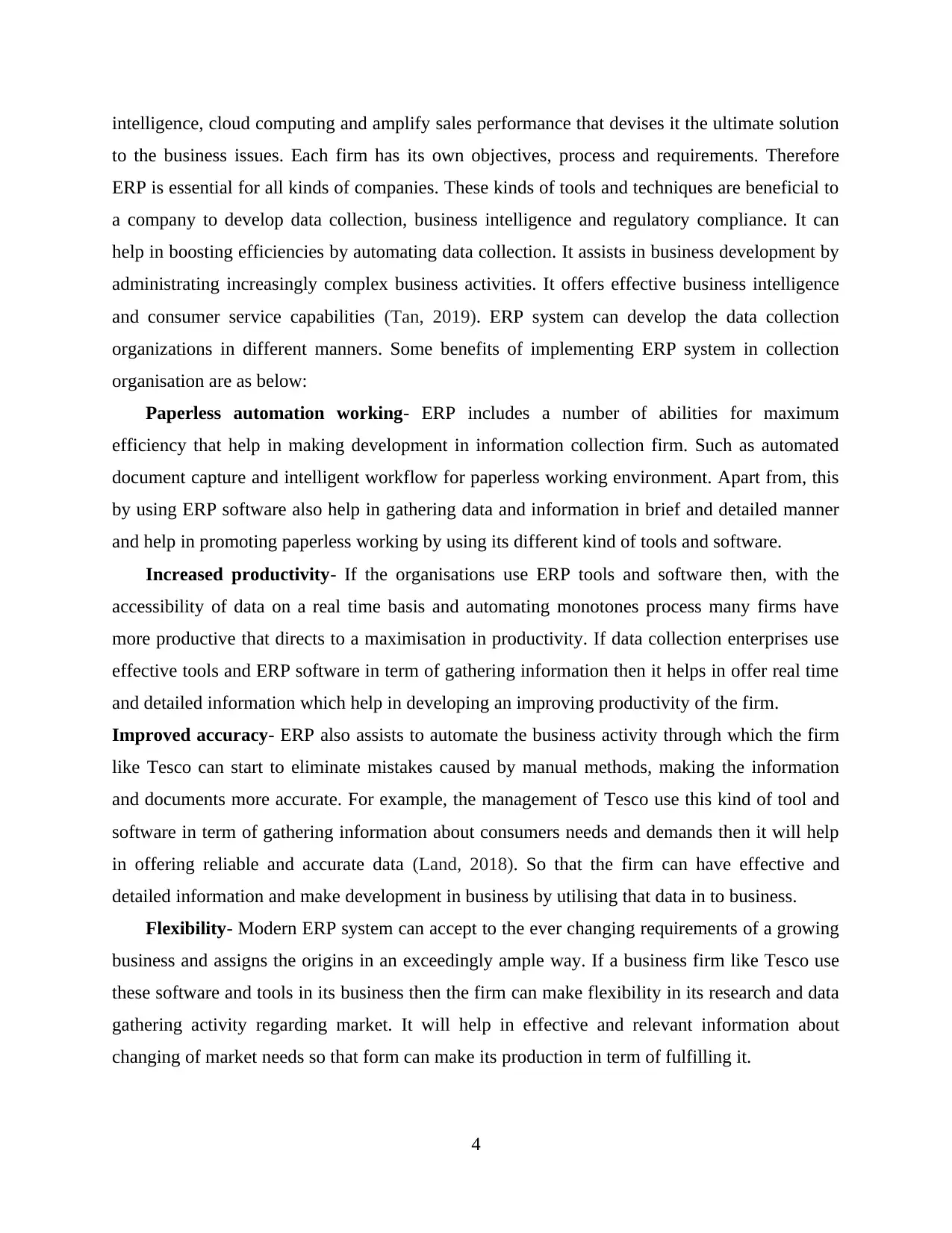
intelligence, cloud computing and amplify sales performance that devises it the ultimate solution
to the business issues. Each firm has its own objectives, process and requirements. Therefore
ERP is essential for all kinds of companies. These kinds of tools and techniques are beneficial to
a company to develop data collection, business intelligence and regulatory compliance. It can
help in boosting efficiencies by automating data collection. It assists in business development by
administrating increasingly complex business activities. It offers effective business intelligence
and consumer service capabilities (Tan, 2019). ERP system can develop the data collection
organizations in different manners. Some benefits of implementing ERP system in collection
organisation are as below:
Paperless automation working- ERP includes a number of abilities for maximum
efficiency that help in making development in information collection firm. Such as automated
document capture and intelligent workflow for paperless working environment. Apart from, this
by using ERP software also help in gathering data and information in brief and detailed manner
and help in promoting paperless working by using its different kind of tools and software.
Increased productivity- If the organisations use ERP tools and software then, with the
accessibility of data on a real time basis and automating monotones process many firms have
more productive that directs to a maximisation in productivity. If data collection enterprises use
effective tools and ERP software in term of gathering information then it helps in offer real time
and detailed information which help in developing an improving productivity of the firm.
Improved accuracy- ERP also assists to automate the business activity through which the firm
like Tesco can start to eliminate mistakes caused by manual methods, making the information
and documents more accurate. For example, the management of Tesco use this kind of tool and
software in term of gathering information about consumers needs and demands then it will help
in offering reliable and accurate data (Land, 2018). So that the firm can have effective and
detailed information and make development in business by utilising that data in to business.
Flexibility- Modern ERP system can accept to the ever changing requirements of a growing
business and assigns the origins in an exceedingly ample way. If a business firm like Tesco use
these software and tools in its business then the firm can make flexibility in its research and data
gathering activity regarding market. It will help in effective and relevant information about
changing of market needs so that form can make its production in term of fulfilling it.
4
to the business issues. Each firm has its own objectives, process and requirements. Therefore
ERP is essential for all kinds of companies. These kinds of tools and techniques are beneficial to
a company to develop data collection, business intelligence and regulatory compliance. It can
help in boosting efficiencies by automating data collection. It assists in business development by
administrating increasingly complex business activities. It offers effective business intelligence
and consumer service capabilities (Tan, 2019). ERP system can develop the data collection
organizations in different manners. Some benefits of implementing ERP system in collection
organisation are as below:
Paperless automation working- ERP includes a number of abilities for maximum
efficiency that help in making development in information collection firm. Such as automated
document capture and intelligent workflow for paperless working environment. Apart from, this
by using ERP software also help in gathering data and information in brief and detailed manner
and help in promoting paperless working by using its different kind of tools and software.
Increased productivity- If the organisations use ERP tools and software then, with the
accessibility of data on a real time basis and automating monotones process many firms have
more productive that directs to a maximisation in productivity. If data collection enterprises use
effective tools and ERP software in term of gathering information then it helps in offer real time
and detailed information which help in developing an improving productivity of the firm.
Improved accuracy- ERP also assists to automate the business activity through which the firm
like Tesco can start to eliminate mistakes caused by manual methods, making the information
and documents more accurate. For example, the management of Tesco use this kind of tool and
software in term of gathering information about consumers needs and demands then it will help
in offering reliable and accurate data (Land, 2018). So that the firm can have effective and
detailed information and make development in business by utilising that data in to business.
Flexibility- Modern ERP system can accept to the ever changing requirements of a growing
business and assigns the origins in an exceedingly ample way. If a business firm like Tesco use
these software and tools in its business then the firm can make flexibility in its research and data
gathering activity regarding market. It will help in effective and relevant information about
changing of market needs so that form can make its production in term of fulfilling it.
4
Paraphrase This Document
Need a fresh take? Get an instant paraphrase of this document with our AI Paraphraser
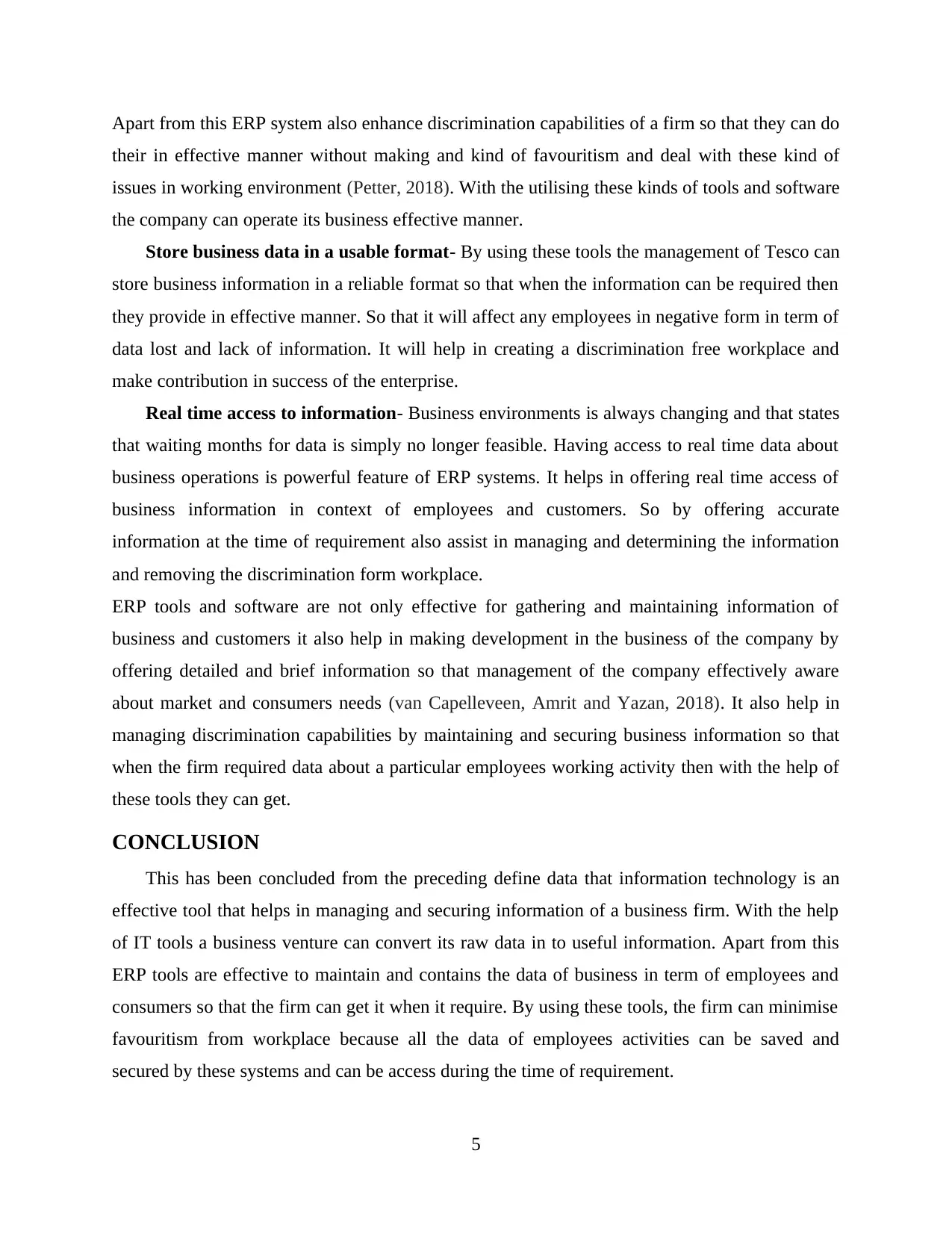
Apart from this ERP system also enhance discrimination capabilities of a firm so that they can do
their in effective manner without making and kind of favouritism and deal with these kind of
issues in working environment (Petter, 2018). With the utilising these kinds of tools and software
the company can operate its business effective manner.
Store business data in a usable format- By using these tools the management of Tesco can
store business information in a reliable format so that when the information can be required then
they provide in effective manner. So that it will affect any employees in negative form in term of
data lost and lack of information. It will help in creating a discrimination free workplace and
make contribution in success of the enterprise.
Real time access to information- Business environments is always changing and that states
that waiting months for data is simply no longer feasible. Having access to real time data about
business operations is powerful feature of ERP systems. It helps in offering real time access of
business information in context of employees and customers. So by offering accurate
information at the time of requirement also assist in managing and determining the information
and removing the discrimination form workplace.
ERP tools and software are not only effective for gathering and maintaining information of
business and customers it also help in making development in the business of the company by
offering detailed and brief information so that management of the company effectively aware
about market and consumers needs (van Capelleveen, Amrit and Yazan, 2018). It also help in
managing discrimination capabilities by maintaining and securing business information so that
when the firm required data about a particular employees working activity then with the help of
these tools they can get.
CONCLUSION
This has been concluded from the preceding define data that information technology is an
effective tool that helps in managing and securing information of a business firm. With the help
of IT tools a business venture can convert its raw data in to useful information. Apart from this
ERP tools are effective to maintain and contains the data of business in term of employees and
consumers so that the firm can get it when it require. By using these tools, the firm can minimise
favouritism from workplace because all the data of employees activities can be saved and
secured by these systems and can be access during the time of requirement.
5
their in effective manner without making and kind of favouritism and deal with these kind of
issues in working environment (Petter, 2018). With the utilising these kinds of tools and software
the company can operate its business effective manner.
Store business data in a usable format- By using these tools the management of Tesco can
store business information in a reliable format so that when the information can be required then
they provide in effective manner. So that it will affect any employees in negative form in term of
data lost and lack of information. It will help in creating a discrimination free workplace and
make contribution in success of the enterprise.
Real time access to information- Business environments is always changing and that states
that waiting months for data is simply no longer feasible. Having access to real time data about
business operations is powerful feature of ERP systems. It helps in offering real time access of
business information in context of employees and customers. So by offering accurate
information at the time of requirement also assist in managing and determining the information
and removing the discrimination form workplace.
ERP tools and software are not only effective for gathering and maintaining information of
business and customers it also help in making development in the business of the company by
offering detailed and brief information so that management of the company effectively aware
about market and consumers needs (van Capelleveen, Amrit and Yazan, 2018). It also help in
managing discrimination capabilities by maintaining and securing business information so that
when the firm required data about a particular employees working activity then with the help of
these tools they can get.
CONCLUSION
This has been concluded from the preceding define data that information technology is an
effective tool that helps in managing and securing information of a business firm. With the help
of IT tools a business venture can convert its raw data in to useful information. Apart from this
ERP tools are effective to maintain and contains the data of business in term of employees and
consumers so that the firm can get it when it require. By using these tools, the firm can minimise
favouritism from workplace because all the data of employees activities can be saved and
secured by these systems and can be access during the time of requirement.
5
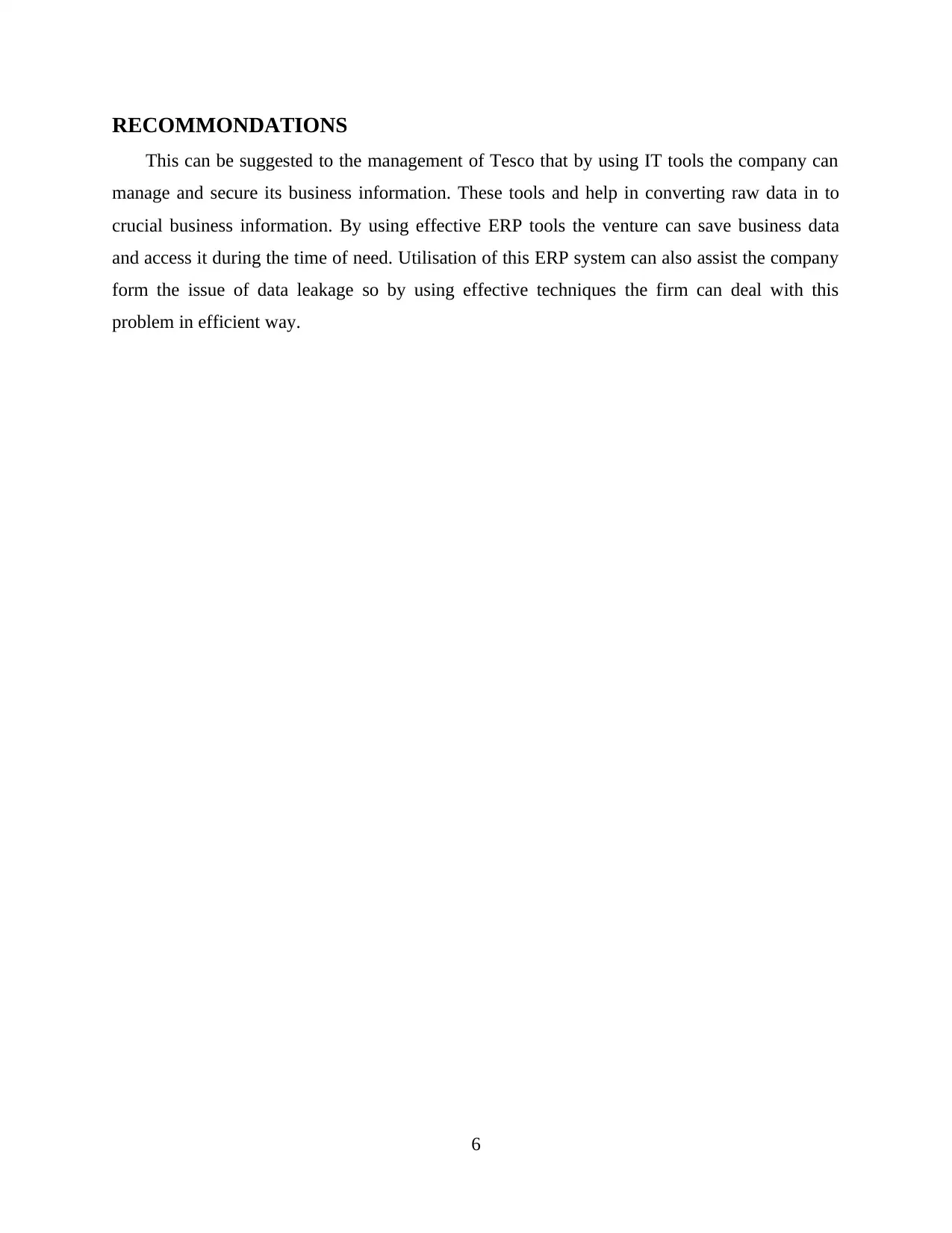
RECOMMONDATIONS
This can be suggested to the management of Tesco that by using IT tools the company can
manage and secure its business information. These tools and help in converting raw data in to
crucial business information. By using effective ERP tools the venture can save business data
and access it during the time of need. Utilisation of this ERP system can also assist the company
form the issue of data leakage so by using effective techniques the firm can deal with this
problem in efficient way.
6
This can be suggested to the management of Tesco that by using IT tools the company can
manage and secure its business information. These tools and help in converting raw data in to
crucial business information. By using effective ERP tools the venture can save business data
and access it during the time of need. Utilisation of this ERP system can also assist the company
form the issue of data leakage so by using effective techniques the firm can deal with this
problem in efficient way.
6
⊘ This is a preview!⊘
Do you want full access?
Subscribe today to unlock all pages.

Trusted by 1+ million students worldwide
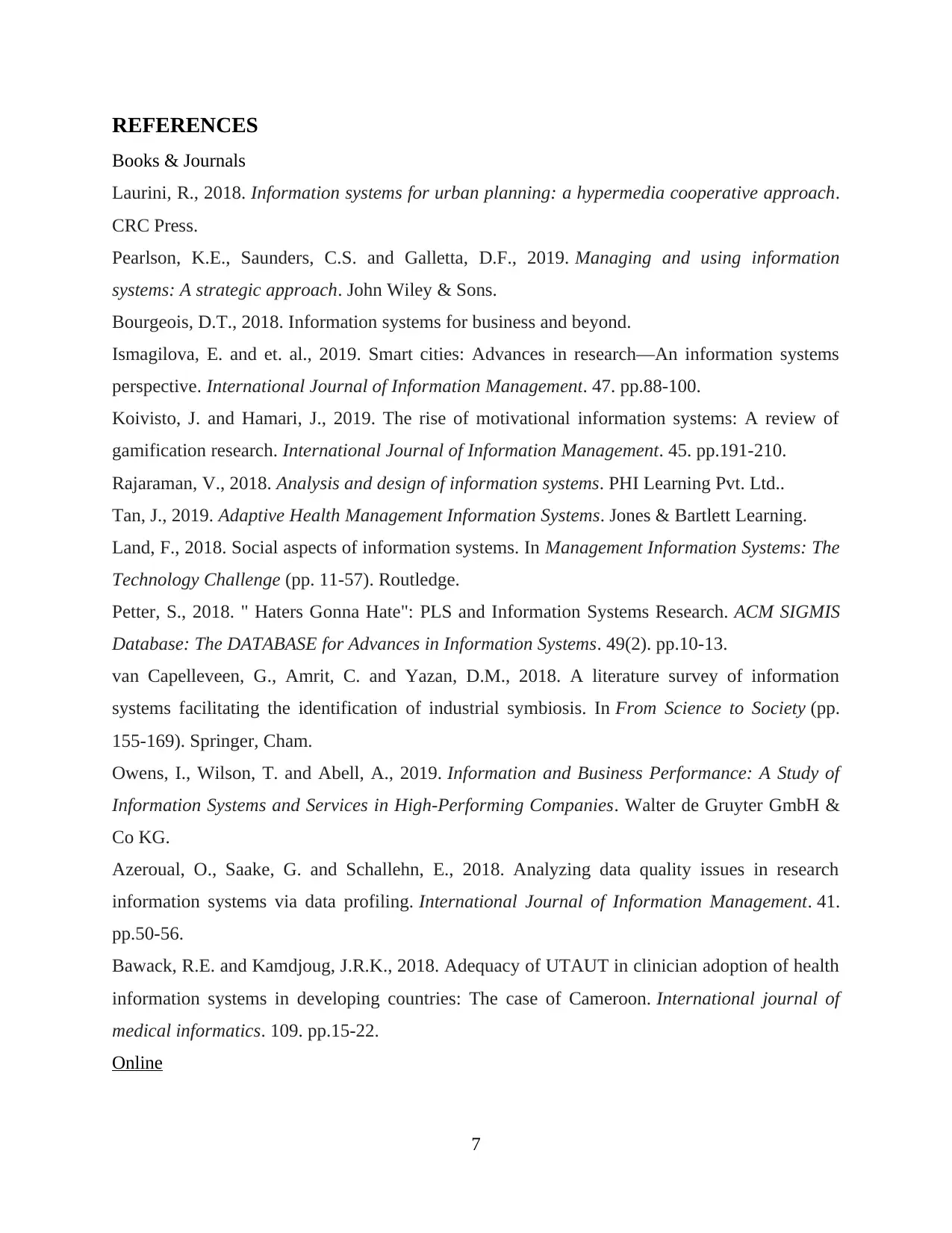
REFERENCES
Books & Journals
Laurini, R., 2018. Information systems for urban planning: a hypermedia cooperative approach.
CRC Press.
Pearlson, K.E., Saunders, C.S. and Galletta, D.F., 2019. Managing and using information
systems: A strategic approach. John Wiley & Sons.
Bourgeois, D.T., 2018. Information systems for business and beyond.
Ismagilova, E. and et. al., 2019. Smart cities: Advances in research—An information systems
perspective. International Journal of Information Management. 47. pp.88-100.
Koivisto, J. and Hamari, J., 2019. The rise of motivational information systems: A review of
gamification research. International Journal of Information Management. 45. pp.191-210.
Rajaraman, V., 2018. Analysis and design of information systems. PHI Learning Pvt. Ltd..
Tan, J., 2019. Adaptive Health Management Information Systems. Jones & Bartlett Learning.
Land, F., 2018. Social aspects of information systems. In Management Information Systems: The
Technology Challenge (pp. 11-57). Routledge.
Petter, S., 2018. " Haters Gonna Hate": PLS and Information Systems Research. ACM SIGMIS
Database: The DATABASE for Advances in Information Systems. 49(2). pp.10-13.
van Capelleveen, G., Amrit, C. and Yazan, D.M., 2018. A literature survey of information
systems facilitating the identification of industrial symbiosis. In From Science to Society (pp.
155-169). Springer, Cham.
Owens, I., Wilson, T. and Abell, A., 2019. Information and Business Performance: A Study of
Information Systems and Services in High-Performing Companies. Walter de Gruyter GmbH &
Co KG.
Azeroual, O., Saake, G. and Schallehn, E., 2018. Analyzing data quality issues in research
information systems via data profiling. International Journal of Information Management. 41.
pp.50-56.
Bawack, R.E. and Kamdjoug, J.R.K., 2018. Adequacy of UTAUT in clinician adoption of health
information systems in developing countries: The case of Cameroon. International journal of
medical informatics. 109. pp.15-22.
Online
7
Books & Journals
Laurini, R., 2018. Information systems for urban planning: a hypermedia cooperative approach.
CRC Press.
Pearlson, K.E., Saunders, C.S. and Galletta, D.F., 2019. Managing and using information
systems: A strategic approach. John Wiley & Sons.
Bourgeois, D.T., 2018. Information systems for business and beyond.
Ismagilova, E. and et. al., 2019. Smart cities: Advances in research—An information systems
perspective. International Journal of Information Management. 47. pp.88-100.
Koivisto, J. and Hamari, J., 2019. The rise of motivational information systems: A review of
gamification research. International Journal of Information Management. 45. pp.191-210.
Rajaraman, V., 2018. Analysis and design of information systems. PHI Learning Pvt. Ltd..
Tan, J., 2019. Adaptive Health Management Information Systems. Jones & Bartlett Learning.
Land, F., 2018. Social aspects of information systems. In Management Information Systems: The
Technology Challenge (pp. 11-57). Routledge.
Petter, S., 2018. " Haters Gonna Hate": PLS and Information Systems Research. ACM SIGMIS
Database: The DATABASE for Advances in Information Systems. 49(2). pp.10-13.
van Capelleveen, G., Amrit, C. and Yazan, D.M., 2018. A literature survey of information
systems facilitating the identification of industrial symbiosis. In From Science to Society (pp.
155-169). Springer, Cham.
Owens, I., Wilson, T. and Abell, A., 2019. Information and Business Performance: A Study of
Information Systems and Services in High-Performing Companies. Walter de Gruyter GmbH &
Co KG.
Azeroual, O., Saake, G. and Schallehn, E., 2018. Analyzing data quality issues in research
information systems via data profiling. International Journal of Information Management. 41.
pp.50-56.
Bawack, R.E. and Kamdjoug, J.R.K., 2018. Adequacy of UTAUT in clinician adoption of health
information systems in developing countries: The case of Cameroon. International journal of
medical informatics. 109. pp.15-22.
Online
7
Paraphrase This Document
Need a fresh take? Get an instant paraphrase of this document with our AI Paraphraser
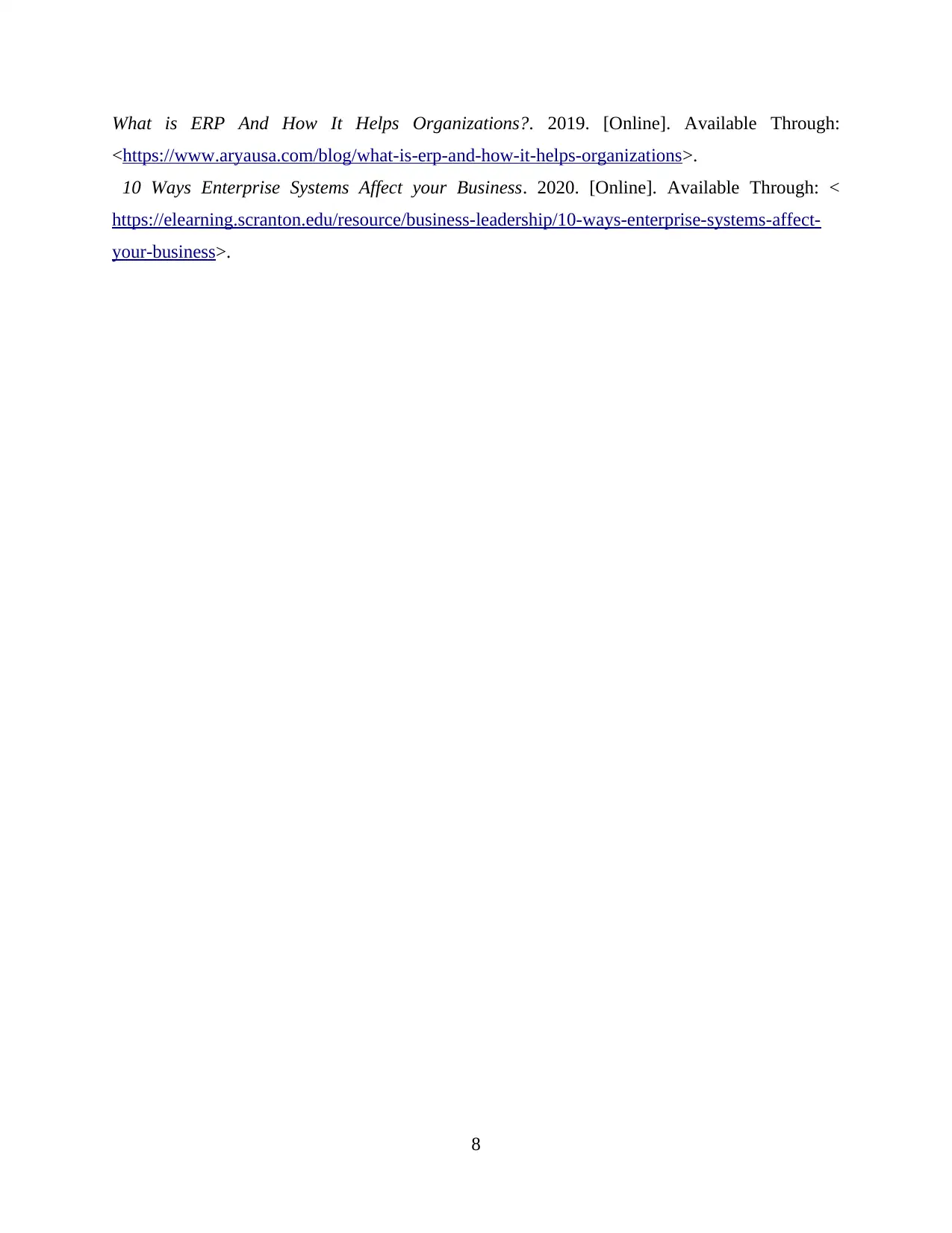
What is ERP And How It Helps Organizations?. 2019. [Online]. Available Through:
<https://www.aryausa.com/blog/what-is-erp-and-how-it-helps-organizations>.
10 Ways Enterprise Systems Affect your Business. 2020. [Online]. Available Through: <
https://elearning.scranton.edu/resource/business-leadership/10-ways-enterprise-systems-affect-
your-business>.
8
<https://www.aryausa.com/blog/what-is-erp-and-how-it-helps-organizations>.
10 Ways Enterprise Systems Affect your Business. 2020. [Online]. Available Through: <
https://elearning.scranton.edu/resource/business-leadership/10-ways-enterprise-systems-affect-
your-business>.
8
1 out of 11
Related Documents
Your All-in-One AI-Powered Toolkit for Academic Success.
+13062052269
info@desklib.com
Available 24*7 on WhatsApp / Email
![[object Object]](/_next/static/media/star-bottom.7253800d.svg)
Unlock your academic potential
Copyright © 2020–2026 A2Z Services. All Rights Reserved. Developed and managed by ZUCOL.





